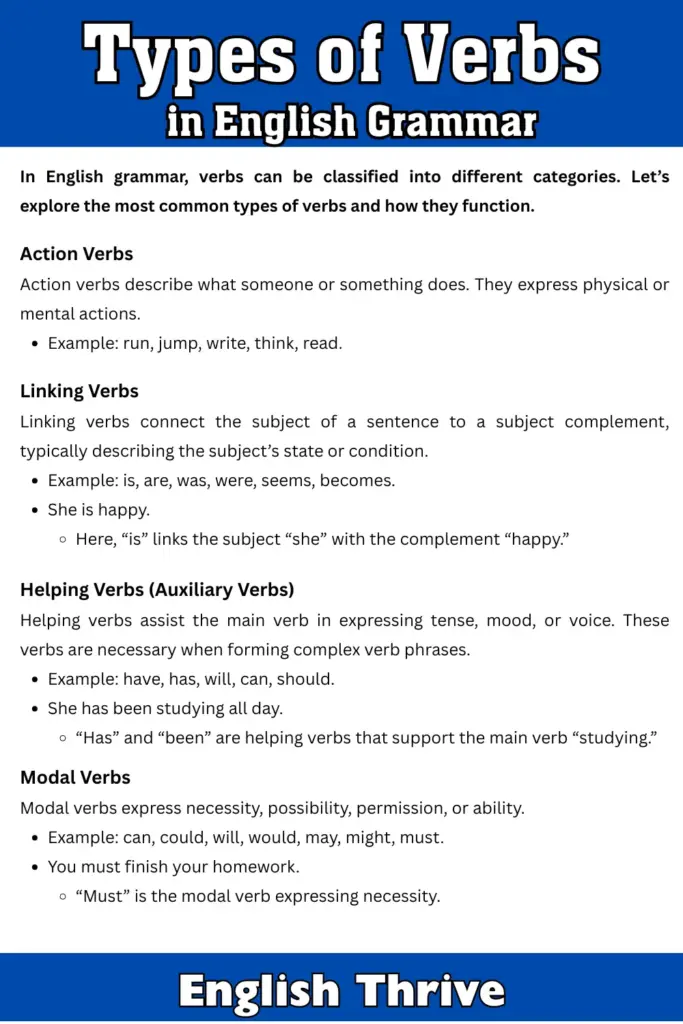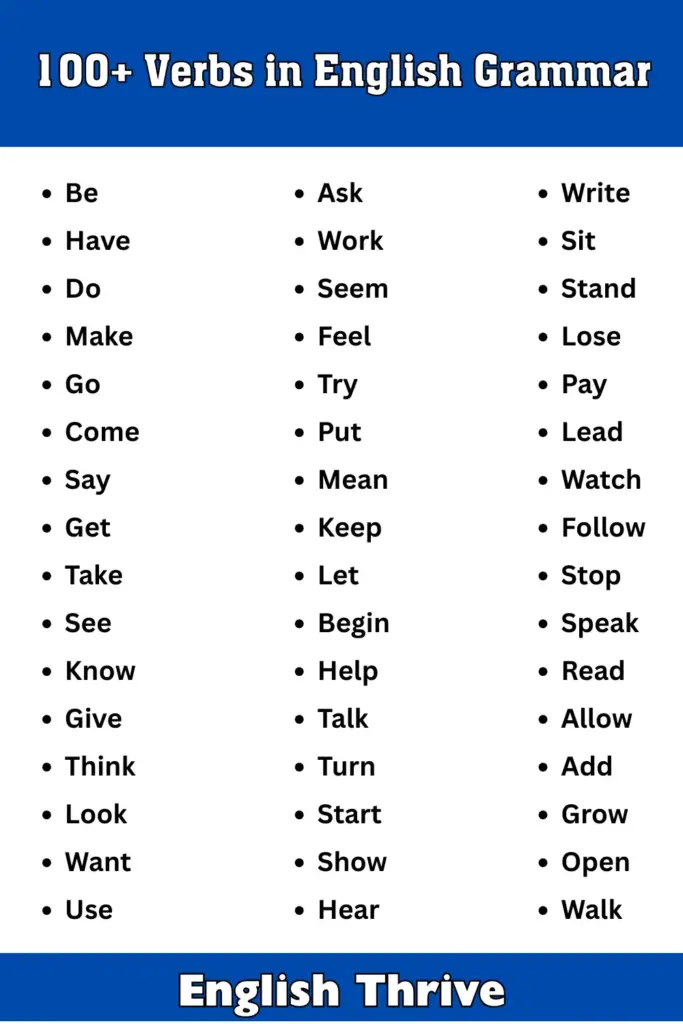English grammar can feel overwhelming at first, but mastering the basics makes a huge difference. One of the most essential elements is the verb in English. Verbs form the foundation of a sentence, giving it action, meaning, and structure. In this blog post, we’ll explore the types and forms of verbs, along with everything you need to know about the verb in English, including free PDF downloads to help you learn and practice effectively.
Contents
ToggleWhat Is a Verb in English Grammar?
A verb is a word that represents an action, event, or state of being. In simple terms, verbs are the words that describe what the subject of a sentence does or what happens to it.
Definition of a Verb
A verb typically tells us:
- What the subject is doing (running, jumping, thinking).
- A state of being ( is, are, am).
- What happens to the subject ( received, learned).
Importance of Verbs in Sentence Making
Without verbs, sentences wouldn’t make sense. They are essential for conveying clear meaning, expressing actions, and forming logical connections between subjects and objects. For example:
- She sings beautifully.
- Here, “sings” is the verb, describing the action of the subject “She.”
Types of Verbs in English Grammar With Pdf
In English grammar, verbs can be classified into different categories. Let’s explore the most common types of verbs and how they function.
Action Verbs
Action verbs describe what someone or something does. They express physical or mental actions.
- Example: run, jump, write, think, read.
Linking Verbs
Linking verbs connect the subject of a sentence to a subject complement, typically describing the subject’s state or condition.
- Example: is, are, was, were, seems, becomes.
- She is happy.
- Here, “is” links the subject “she” with the complement “happy.”
Helping Verbs (Auxiliary Verbs)
Helping verbs assist the main verb in expressing tense, mood, or voice. These verbs are necessary when forming complex verb phrases.
- Example: have, has, will, can, should.
- She has been studying all day.
- “Has” and “been” are helping verbs that support the main verb “studying.”
Modal Verbs
Modal verbs express necessity, possibility, permission, or ability.
- Example: can, could, will, would, may, might, must.
- You must finish your homework.
- “Must” is the modal verb expressing necessity.
Pdf Download: Types of verbs in English Grammar
 Verb in English
Verb in English
Verb Forms in English Grammar (PDF Notes Included)
Verbs change their form depending on tense, mood, and aspect. Understanding these verb forms is vital for effective communication.
The 3 Main Verb Forms
- Base Form: The original, unconjugated form of the verb.
- Example: run, eat, sleep.
- Past Tense: Describes an action that has already happened.
- Example: ran, ate, slept.
- Past Participle: Typically used with helping verbs to create perfect tenses.
- Example: have run, have eaten, have slept.
Irregular Verbs and Their Forms
Some verbs do not follow regular conjugation rules. These are called irregular verbs. They have unique past tense and past participle forms.
- Example:
- Go → Went → Gone
- Take → Took → Taken
Learning these irregular forms is essential for mastering English verb usage.
Regular Verbs and Their Forms
Regular verbs follow a consistent pattern in their past tense and past participle forms. They are formed by adding -ed to the base verb.
- Example:
- Walk → Walked → Walked
- Talk → Talked → Talked
Pdf Download: Verb Forms in English Grammar
100+ Verbs in English Grammar (Free PDF Download)
Below are some of the most frequently used verbs in English:
Here is the list of 100 common verbs in English grammar:
- Be
- Have
- Do
- Make
- Go
- Come
- Say
- Get
- Take
- See
- Know
- Give
- Think
- Look
- Want
- Use
- Find
- Tell
- Ask
- Work
- Seem
- Feel
- Try
- Leave
- Call
- Become
- Put
- Mean
- Keep
- Let
- Begin
- Help
- Talk
- Turn
- Start
- Show
- Hear
- Play
- Run
- Move
- Like
- Live
- Believe
- Hold
- Bring
- Write
- Sit
- Stand
- Lose
- Pay
- Meet
- Include
- Continue
- Set
- Learn
- Change
- Lead
- Understand
- Watch
- Follow
- Stop
- Create
- Speak
- Read
- Allow
- Add
- Spend
- Grow
- Open
- Walk
- Win
- Teach
- Choose
- Build
- Fall
- Study
- Cut
- Catch
- Play
- Stop
- Rise
- Drive
- Wear
- Consider
- Appear
- Serve
- Die
- Send
- Expect
- Build
- Stay
- Reach
- Develop
- Carry
- Break
- Eat
- Support
- Sing
- Introduce
- Measure
 Verb in English
Verb in English
You can download the full list of 100 most common verbs in PDF format for quick reference and practice.
Free Download: 100+ Common Verbs in English Grammar PDF
How to Use Verbs Effectively in Your Writing
Understanding verbs is crucial not just for grammar but for effective communication. Here are a few tips on how to use verbs correctly in your writing:
Verb Tenses and Their Application
Tense is essential for expressing when an action occurs. In English, there are three main tenses: present, past, and future. Each tense has its own set of rules for conjugation, and it’s important to use them correctly.
- Example: I eat (present), I ate (past), I will eat (future).
FAQs About Verb in English Grammar Pdf
What are the most important verbs to learn in English?
Some of the most important verbs include
- Be (am, is, are)
- Have
- Do
- Go
- Make
What is the difference between regular and irregular verbs?
Regular verbs follow a set pattern (add -ed for past tense), while irregular verbs do not follow this pattern and have unique forms.
- Example:
- Regular: Walk → Walked → Walked
- Irregular: Go → Went → Gone
Conclusion
Verbs are a fundamental part of English grammar, essential for forming meaningful sentences. Whether you’re learning the basics of verbs or mastering complex verb forms, understanding how verbs work in different contexts will greatly improve your language skills.
Free Verb in English Grammar PDFs
You can find free verb PDFs with detailed explanations, examples, and exercises online. Some resources also include verb lists, charts, and conjugation tables, which can help you master verb usage.

